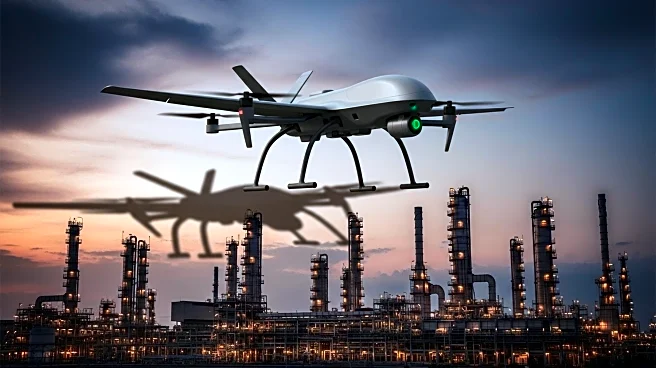What's Happening?
Ukraine has intensified its drone attacks on Russian oil refineries, significantly impacting Russia's oil refining capacity. According to reports, these strikes have disabled 20% of Russia's refining operations in August, coinciding with peak seasonal demand. This has led to record-high gasoline prices and widespread fuel shortages across Russia, with social media flooded with images of long lines at gas stations. Ukraine's strategy aims to weaken Russia's war economy by targeting its energy infrastructure, as Western allies have been hesitant to impose stricter sanctions on Russia's energy sector. The attacks are part of a broader campaign that includes strikes on military production facilities and logistics hubs, aiming to disrupt Russia's ability to sustain its military operations in Ukraine.
Why It's Important?
The disruption of Russia's oil refining capacity by Ukrainian drone strikes represents a significant escalation in the conflict, directly targeting the economic underpinnings of Russia's military efforts. This strategy could potentially weaken Russia's ability to finance its ongoing invasion of Ukraine. The economic impact is already visible with rising fuel prices and shortages, which could lead to domestic discontent within Russia. For Ukraine, these actions demonstrate a shift towards more aggressive tactics to counter Russian advances, potentially altering the dynamics of the conflict. The situation also highlights the limitations of Western sanctions and the need for more direct actions to impact Russia's economy.
What's Next?
Ukraine's continued development and deployment of long-range drone and missile capabilities suggest further strikes on Russian infrastructure could be forthcoming. The introduction of Ukraine's new long-range cruise missile, the Flamingo, with a range of over 3,000 kilometers, could further escalate the situation. If mass-produced, these missiles could pose a significant threat to Russia's energy and military infrastructure. The Kremlin may need to reassess its defense strategies to protect critical assets across its vast territory. Additionally, the international community may face increased pressure to respond to the evolving conflict dynamics.
Beyond the Headlines
The ongoing conflict and Ukraine's strategic targeting of Russian energy infrastructure raise ethical and legal questions about the conduct of war and the targeting of civilian economic resources. The long-term implications for global energy markets and geopolitical stability are significant, as disruptions in Russian oil supplies could affect global prices and energy security. The situation also underscores the evolving nature of warfare, where non-state actors and smaller nations can leverage technology to challenge larger powers.









